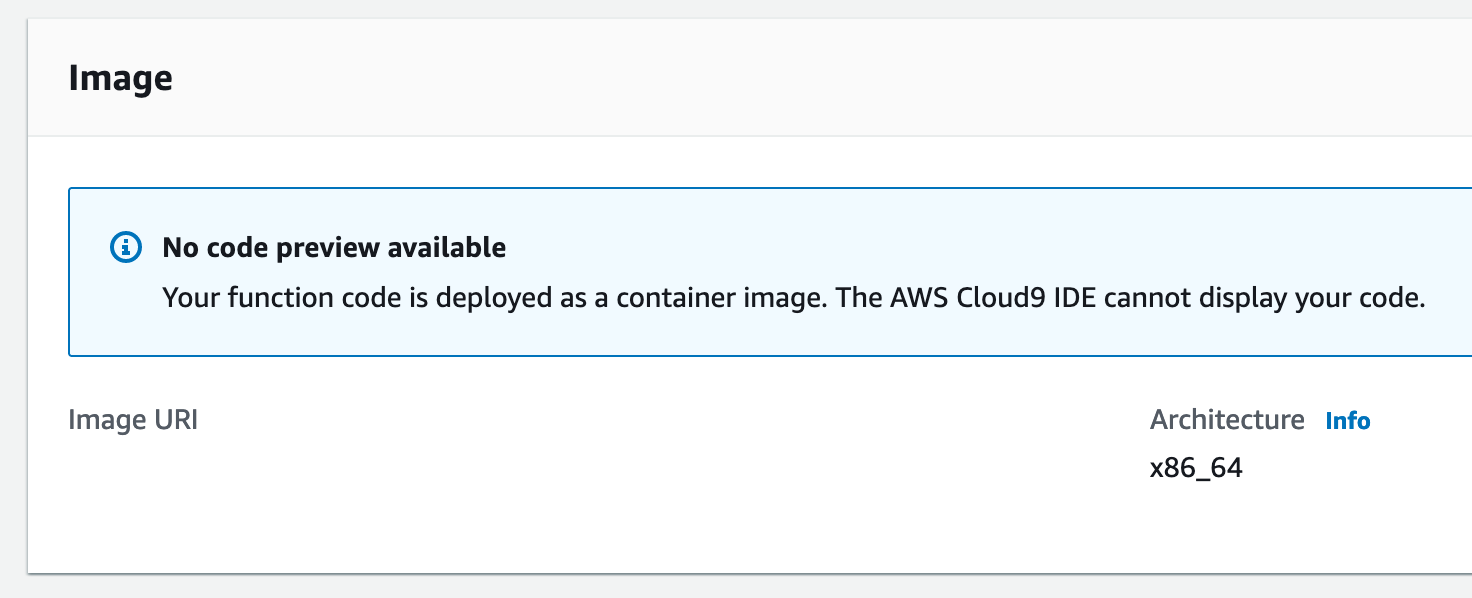I have a Python script running in a Docker container on AWS Lambda. I'm using the recommended AWS image (public.ecr.aws/lambda/python:3.9), which comes with SQLite version 3.7.17 (from 2013!). When I test the container locally on my M1 Mac, I see this:
$ docker run --env-file .env --entrypoint bash -ti my-image
bash-4.2# uname -a
Linux e9ed14d35cbe 5.10.104-linuxkit #1 SMP PREEMPT Thu Mar 17 17:05:54 UTC 2022 aarch64 aarch64 aarch64 GNU/Linux
bash-4.2# sqlite3 --version
3.7.17 2013-05-20 00:56:22 118a3b35693b134d56ebd780123b7fd6f1497668
However, I use newer SQLite features, so I need to find a way to use a newer version of the library. The most straightforward solution would be to install a binary package as suggested in this answer. The docs say it should be as simple as installing using pip. Unfortunately, when I attempt to use this approach inside the Docker container, I get this:
bash-4.2# pip3 install pysqlite3-binary
ERROR: Could not find a version that satisfies the requirement pysqlite3-binary (from versions: none)
ERROR: No matching distribution found for pysqlite3-binary
And I get the same error when I attempt to install it outside the container using pipenv (which is what I'm actually using for package management):
🕙 01:08:24 ❯ pipenv install pysqlite3-binary
Installing pysqlite3-binary...
Error: An error occurred while installing pysqlite3-binary!
Error text:
ERROR: Could not find a version that satisfies the requirement pysqlite3-binary (from versions: none)
ERROR: No matching distribution found for pysqlite3-binary
✘ Installation Failed
Am I doing something wrong? And if not, how can I get a recent version of SQLite which Python can use in this container? Do I really need to use a separate build stage in the Dockerfile as suggested here and copy the rpm components into place as laid out here? That feels like a lot of work for something that many people presumably need to do all the time.
Update: I tried the rpm approach inside the container using version 3.26 from EPEL8 (IIUC) and it failed with a bunch of dependency errors like this:
bash-4.2# curl --output-dir /tmp -sO https://vault.centos.org/centos/8/BaseOS/aarch64/os/Packages/sqlite-3.26.0-15.el8.aarch64.rpm
bash-4.2# yum localinstall /tmp/sqlite-3.26.0-15.el8.aarch64.rpm
Loaded plugins: ovl
Examining /tmp/sqlite-3.26.0-15.el8.aarch64.rpm: sqlite-3.26.0-15.el8.aarch64
# etc.
--> Finished Dependency Resolution
Error: Package: sqlite-3.26.0-15.el8.aarch64 (/sqlite-3.26.0-15.el8.aarch64)
Requires: libc.so.6(GLIBC_2.28)(64bit)
# Plus 6 other package dependency errors
Error: Package: nss-softokn-3.67.0-3.amzn2.0.1.aarch64 (@amzn2-core)
Requires: libsqlite3.so.0()(64bit)
Removing: sqlite-3.7.17-8.amzn2.1.1.aarch64 (@amzn2-core)
libsqlite3.so.0()(64bit)
Updated By: sqlite-3.26.0-15.el8.aarch64 (/sqlite-3.26.0-15.el8.aarch64)
Not found
Obsoleted By: sqlite-3.26.0-15.el8.aarch64 (/sqlite-3.26.0-15.el8.aarch64)
Not found
Available: sqlite-3.7.17-8.amzn2.0.2.aarch64 (amzn2-core)
libsqlite3.so.0()(64bit)
You could try using --skip-broken to work around the problem
You could try running: rpm -Va --nofiles --nodigest
When I try --skip-broken, it just skips installing the 3.26 package altogether.
Update 2: I've tried downloading the Python 3.9 wheel from pysqlite3-binary manually. However, it looks like that project only produces wheels for x86_64, not the aarch64 platform which Lambda uses. (This is not correct, see answer.) So presumably that's why pip is not finding it.

